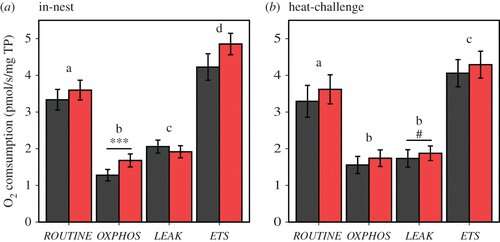December 8, 2021 report
Zebra finches alter song to eggs during hot periods to repress heat production in embryo cells

A team of researchers from Deakin University in Australia and Clemson University in the U.S. has found that female finches change the song they sing to their eggs when temperatures rise. This results in hatchling mitochondria producing more ATP and less heat. In their paper published in Proceedings of the Royal Society B, the group describes experiments they conducted with captive zebra finches.
Prior research has shown that female zebra finches sing songs when nesting. In this new effort, the researchers found that in hot conditions, the finches change their tunes in a way that induces mitochondria in the cells of the embryos to produce less heat.
Mitochondria are organelles found inside cells. Part of their job is to manage the process of using the energy stored in sugars and fats to make adenosine triphosphate—the food that powers cells. They are also responsible for converting the same energy into heat. Through an unknown process, the mitochondria determine how much energy to use for making ATP and how much to use to generate heat to maintain body temperature. In this new effort, the researchers found that mother zebra finches can send signals to the mitochondria in embryo cells telling them to produce more ATP and less heat.
The researchers made this discovery by placing 111 zebra finch eggs in incubators and playing recordings of zebra finch "heat songs" for half of them and non-heat songs to the others every day until they hatched. After they hatched, the researchers placed the chicks with foster parents living in different cages heated to different temperatures. After two weeks, they collected blood samples from all of the chicks and tested them. They found that the chicks who had been exposed to heat songs as embryos produced more ATP relative to heat than did those chicks exposed to non-heat songs. The researchers suggest this shows that the mother's heat songs served to protect their embryos from overheating during hot spells, and that the impact of the songs likely also resulted in smaller offspring.
More information: Eve Udino et al, Prenatal acoustic programming of mitochondrial function for high temperatures in an arid-adapted bird, Proceedings of the Royal Society B: Biological Sciences (2021). DOI: 10.1098/rspb.2021.1893
Journal information: Proceedings of the Royal Society B
© 2021 Science X Network


















